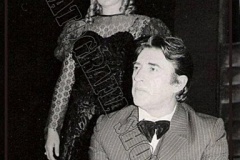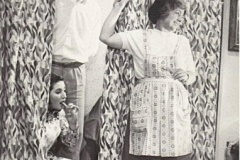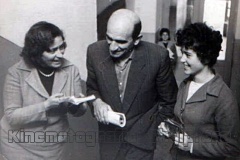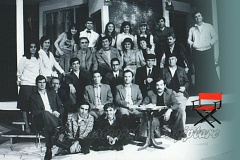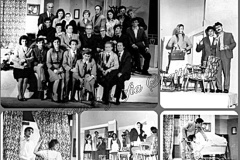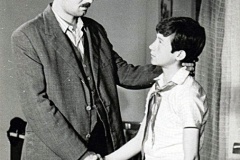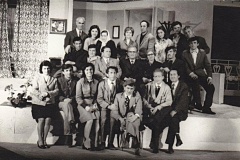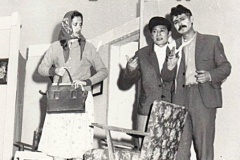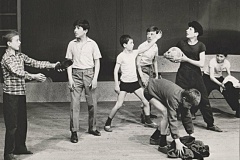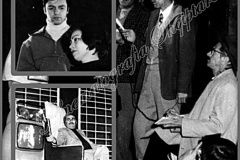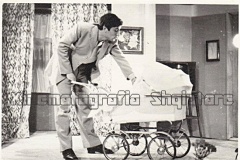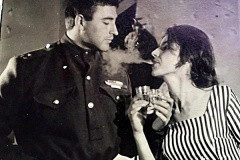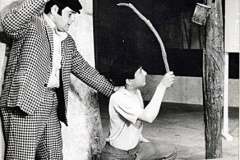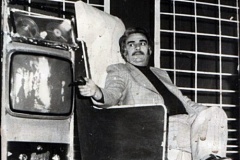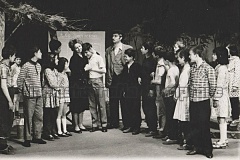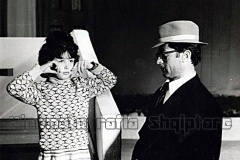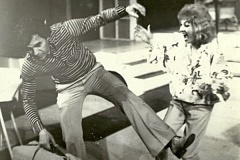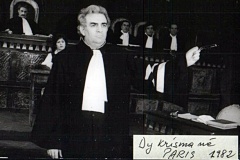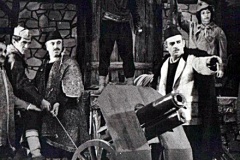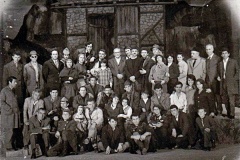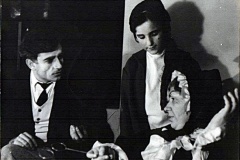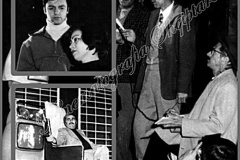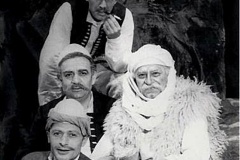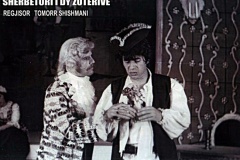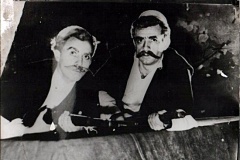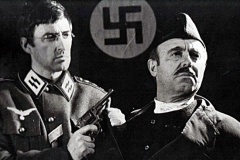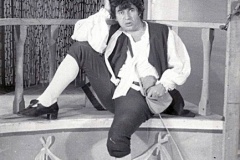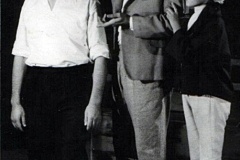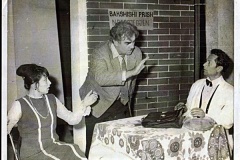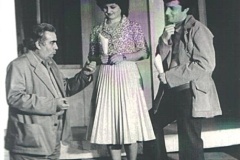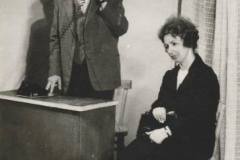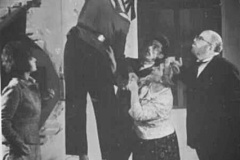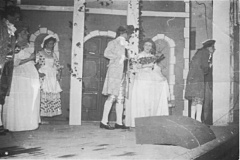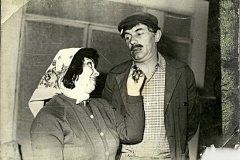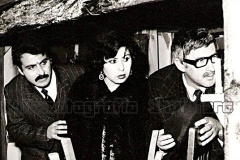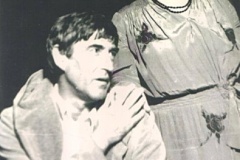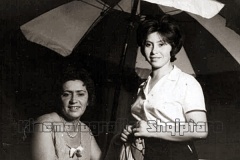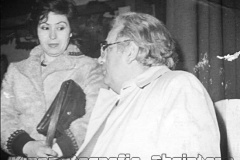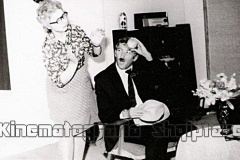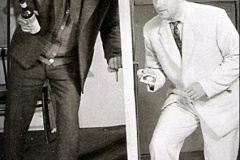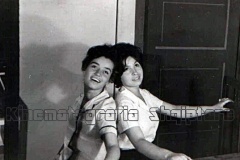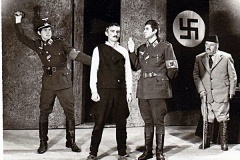“SKAMPA” THEATRE.
Dramatic theater in the city of Elbasan, which stages stage plays such as drama, tragedy, comedy, farce, etc.
The building was built in 1938. It is located in the central square of the city, with a beautiful view, the front facade and the entrance in the form of a dominating arch. It has a hall with 450 seats, with a very slight slope; side boxes, balcony, stage, lobby where there is a bar-cafe, posters of performances and photos are placed, the actors’ and management’s premises on the second floor from the back, the rehearsal hall, the decor warehouse, etc.


The theater inherited a rich experience from the city’s Amateur Theater Movement, especially from the artistic societies “Skampa”, “Afërdita” and the theater groups that operated in the city and its surroundings. The “Afërdita” society, founded in 1919, had a mandolin group, a theater group and a brass band. Its theater group, established in 1918, performed the play Besa by Sami Frashëri*, several comedies by Kristo Floqi (The End of the Drink, The Bridegroom with the Rape, The Banker’s Daughter, etc.), as well as a play by a foreign author (The Brave Girl).

From 1927 onwards, the theater group of the “Normal School” was active in the city, which staged several tragedies by the famous Elbasan playwright Et’hem Haxhiademi*, such as Ulisi, Akili, Aleksandri (the latter won a Special Award at the meeting of the country’s theaters), the drama Lulja e Kujtimit by Foqion Postoli*, etc. After the liberation of the country, there was a rapid development of the Amateur Theater Movement. Many plays prepared by the theater group of the city’s House of Culture, foreign plays and those by Albanian playwrights, became popular.

The establishment of the “Popular Theater”, professional theatres in the cities of Korça, Shkodra, Durrës had created the conditions for the establishment of a professional theatre in Elbasan. Driven by the passion and results achieved in the preparation of many theatre performances during the 1950s and early 1960s, it was decided that, from the most talented amateurs of the city, the first professional troupe would be created on July 16, 1962. The core of selected actors who created this new troupe included: Skënder D. Hoxha, Haxhi Sejko, Thanas Borodani*, Hysni Hatipi, Demir Hyskja*, Antoneta Kristo, Thoma Kristo, Arta Luzi, Englantina Stafa, Pavlina Gjyli, etc.

Later, came actors who had graduated from the “Aleksandër Moisiu” acting school and the Higher Institute of Arts, drama department, such as Tomor Himçi, Shpëtim Shmili*, Miho Gjini*, Robert Ndrenika* etc.
The first director of the troupe was Lec Shllaku*. Maintaining the tradition of the city’s Amateur Movement, still inexperienced, the theater initially performed several one-act plays, to quickly come to the staging of the first full-length play, Naum Prifti’s Rrethimi i bardhë (1962).




During the 60s, various plays were staged on its stage, some of which had a long echo among the city’s and wider public: Fadil Paçrami’s Në tufan*, Ndrek Lucës’s Shtatë shaljanët* (1963), Golsworth’s Kutia prej argjendi (1964), A. Sallinska’s Trumbetjerja (1965), Hjit ikin nda Vath Koreshit’s Mountains* (1967), Katër nga armata e S. Begolli (1968), etc.
Director Lec Shllaku provided valuable assistance. The staging of the comedy “Njeriu qe pa dëtëmin me sy” by Viktor Eftimiu* (1965) was a resounding success, starring Robert Ndrenika* in the role of Filimon and Shpëtim Shmili in the role of the vagabond, a comedy which was re-staged after more than 40 years (2007) by Spiro Duni with Robert Ndrenika as Filimon.
Also, a warm reception was given to Thanas Borodani’s comedy “Udha e Zavalinajve” (1967), which brought a joyful atmosphere related to the civilizing processes of the family, even though the problems brought, especially the situation and the solution, were “oriented” to match the imposed phenomenon of “voluntarily” going to the village.
In the 70s-80s, the theater troupe was enriched with young educated actors, increasing the quality of interpretation. It was oriented towards tackling a sharp social problem, which was related to the contemporary developments of the country, even though the political tendency damaged quite a few parts, with the schemes offered for the preconceived settlement and resolution of conflicts, with the foreseen attitudes of the characters, etc.
Among the plays that left an impression on the viewer of the time were: Fadil Krajë’s Sinjalet e natë* (1970), Ruzhdi Qatipi’s Avalanche (1972), Loni Papa’s Cuca e maleve* (1973), Thanas Borodani’s Pëllezëri and Miliano Stefë’s Për jećenje* (1974), Ruzhdi Pulahë’s Doctor Patient* (1978).
The gaze of the artists of this theater was usually directed by the events, stories and characters of the Anti-Fascist National Liberation War, those from the annals of history or the heroic acts of prominent figures of the nation, as seen in the plays “Kyçi i artë” by Fahri Balliu* (1982), Familja e peshkatarit by Sulejman Pitarka* (1971), Lulet e shegës by Kolë Jakovë (1975), Dy krisma në Paris by Pëllumb Kulla* and Sheri Mita* (1983), Gjëmimi i një vjeshte by Tomor Shishmani, etc.
The dramatization of the novel Rruga e shtepise sime by the Kosovar writer Siri Sulejmani by Fahri Balliu* under the title Tokë e ndezur (1982), was a performance that created strong emotions, built with epic and dramatic highlights related to the resistance of Albanians to Serbian violence to displace them from their ethnic lands, where the main roles were distinguished by the beautiful acting of Demir Hyske* and Kadri Roshi as a special guest. In addition to tragedies and dramas, many comedies, farces, pieces of absurd theater or “laboratory theater” have also been staged in this theater.
Thus, a number of comedies have found a well-deserved place and been welcomed by the public, such as Besim Levonjë’s Prefekti* (1974), Sheri Mite’s Familjet e udjeti (1974), K. Goldoni’s Shërbëtori i dy pandirinjve (1983), etc. Directors such as Lec Shllaku*, Tomor Shishmani, and especially Spiro Duni* gave new spirit, dynamics, and artistic space to the performances performed in this theater in the 1980s, raising the quality of acting to a new level, as well as the directorial concepts and the treatment of the stage space with a more contemporary artistic language. In addition to the directors of the troupe, a number of dramas and comedies have also been staged by Xhelal Bilali, Astrit Çerma, etc.
Dramas that had a significant impact on the time were: F. Balliu’s “Shtegu i zene” and B. Myftari’s “Drita te ndezura” (1986), Sh. Shmilit’s “Zemer e shqetesuar”* and P. Konten’s “Engjejt e sketerres” – Zh. Ballak (1987), L. Helman’s “Neperka” (1989), 6 persona ne pyetje and F. Handie R. Hosein’s Krishtlindjet” (1990, 1992), N. Ostrovski’s “Fajtor pa faj” (1995); and comedies: Pirro Man’s Tour* (1988), “Sa gjethe te thata kete vjeshte” by Pëllumb Kulla*, directed by S. Duni. With this show, the “Skampa” theater won the First Prize at the 9th Theater Festival, held in Tirana from 13 to 18 November 1989
To be continued…..
The exclusive date: October 16, 2025
_____________________
Albanian Cinematography in activity since 2013
Discover more from Albanian Cinematography - Sport
Subscribe to get the latest posts sent to your email.

